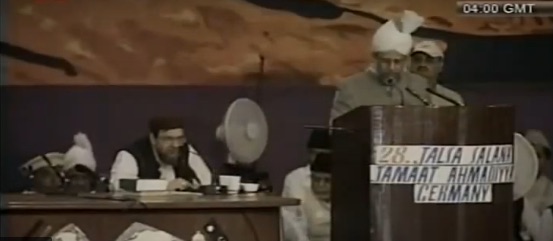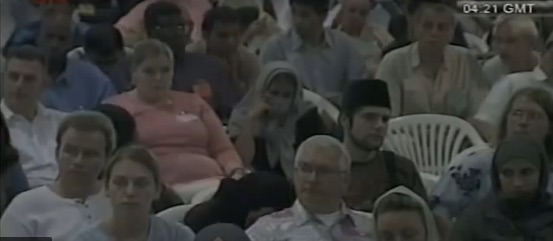The following address was made to special guests at the Annual Gathering in Mannheim, Germany in August 2003 by Hazrat Mirza Masroor Ahmad, Khalifatul Masih V. After reciting Shahada and the opening chapter of the Holy Qur’an, Hazrat Khalifatul Masih V recited Ch.42: V.14 of the Holy Qur’an.

Firstly, I wish to thank everyone who has spared time to take part in this Jalsa (Annual Gathering). However, I regret that because of my other commitments in this Jalsa, I may not be able to spend much time with you.
In the few minutes that I have, I wish to present to you in the words of the Founder of the Ahmadiyya Muslim Community, Hazrat Mirza Ghulam Ahmad of Qadian(as) , his thoughts about what religion requires from us and the purpose that prophets serve.

But before that let me provide you with a translation of the verse of the Holy Qur’an I recited earlier:
He has prescribed for you the religion which He enjoined on Noah, and which We have now revealed to thee, and which we enjoined on Abraham and Moses and Jesus, saying, ‘Remain steadfast in obedience, and be not divided therein. Hard upon the idolaters is that to which thou callest them. Allah chooses for Himself whom He pleases, and guides to Himself him who turns to Him. (Ch.42: V.14)
The Purpose of Religion
The Promised Messiah(as) has said:
‘Purpose of religion is that man should purify one’s self of all evil so that one’s soul is always in prostration at the threshold of Allah. A person should be imbued with firm belief, love, discernment and understanding, sincerity and loyalty. A special reformation should take place in him so that he attains paradise in this very world.’ (Lecture Sialkot, Roohani Khazain Vol. 20 pp. 233-234)
The Promised Messiah(as) says:
‘It should be obvious that by adopting a faith, the true objective is that one should have such firm belief in the God Who is the Fountain of salvation that it is as if he beholds God with his own eyes. The evil spirit of sin wishes to destroy man. Man can never protect himself from the lethal poison of sin till he has total faith in a Perfect and Living God and till he knows that there is a God Who punishes the guilty but rewards the rightly guided with everlasting happiness. It has generally been observed in our daily life that if a person is convinced of the destructive nature of something, he would never go anywhere near that thing. For example, no one deliberately takes poison. No one stands in front of a wild lion. No one willingly sticks one’s hand in a snake’s pit. Then why does a person knowingly commit sins. It is only because he lacks the conviction he has in other things. So the foremost obligation of man is that he should have a firm belief in God. He should adopt that religion through which firm belief can be acquired so much so that he fears God and he saves himself from sin. But how can such faith be acquired? Can it be achieved through myths or fables? Certainly not. Can it be obtained by dint of logic or some conjecture? Never. So it should be abundantly clear that there is only one way of acquiring belief and it is that through communication with God, a person should bear witness to His extraordinary miracles and by repeated observation, he should believe in the Omnipotence and Power of God or else he should remain in the company of a person who has already reached that stage of belief.’ (Naseem Dawat, Roohani Khazain Vol.19: pp. 447-448)
The Purpose of Prophets
Prophets are sent to draw man closer to God and to reform man. In this connection, the Promised Messiah(as) says:
‘The purpose common to the advent of all the prophets, on whom be peace, is to establish true and real love of God and to create a respect for human rights and an affection for mankind and amongst brethren. Until that is achieved, everything is just a ritual.’
Explaining this further, the Promised Messiah(as) says:
‘Indeed, there is no success until man keeps his affairs with God honest and transparent and until he fulfils the two duties. There are two types of duties, Haquq Allah, the obligation of man to his Creator and Haquq Al’abad, the duty man owes to the rest of Creation.’
‘The duty of man to man can also be divided into two categories. One, is towards those who have become your brothers in faith, whether he is a brother, father or a son. They all develop a special bond of brotherhood of common faith. The second is to carry a true sympathy towards all human beings.’
‘As far as the duty of man to God is concerned, the most important duty is to worship and pray to Him and that prayer should not be tainted with any personal want. In fact, even if there were to be no heaven or hell, God should be worshipped irrespective and there should be no difference in the personal love that the created should have for its Creator.’ (Malfoozat; vol. 2, pp. 67-68: published in Rabwah)
The Promised Messiah(as) further says:
‘After a lot of thinking and reflection and following repeated revelation from God, it has become obvious to me that although there are many sects in this country and religious differences have inundated the land, there is only one main cause for these differences. The fact is that spiritual powers and compassion and the love of God has diminished in many people. That Divine light, which helps to distinguish between Truth and Falsehood, has begun to fade from many hearts and the world is moving towards atheism… The proof of this is that the conduct is not what it ought to be. Deeds do not match the words. I do not wish to criticise anyone who is secretly righteous. But what is generally observed is that the purpose for which religion has been made compulsory is largely redundant. Most of the people do not try to inculcate the true piety of the heart, the true love of God, and a sincere sympathy towards the creation. They do not possess those pure virtues and values that are the heart of any religion like forbearance, mercy, justice, and humility. It is regrettable that while conflicts and wars in the name of religion are on the increase in the world, spirituality is on the decline.’ (Lecture Lahore, Roohani Khazain: vol. 20, pp.147-148)
Therefore it is important for a believer of each religion to reflect that if his relationship with a Living God and his spirituality has diminished or ceased altogether and there is an endless pursuit of materialism, the believer should find out what are the causes of this state of affairs. Is there something amiss in the teachings of the prophets, which evidently cannot be the case. Is there any error in understanding the religious Scriptures? Perhaps there is something written in them but without proper thought and careful study, we accept someone else’s interpretation. May be, what different religions, different scriptures and different prophets taught have been altered with the passage of time and these interpolations have become the cause for the lack of spirituality and religious differences. Therefore, I request you to think about these matters seriously, because until you know and understand the basic teachings of your own religion, the very teachings that were given by the prophets in their own time, you will find it difficult to understand Islam.
The Muslim religious scripture, the Holy Qur’an, was revealed to the Holy Prophet of Islam(sa). There is a declaration from God in this Scripture that:
Verily, We Ourelf have sent down this Exhortation, and most surely We will be its guardian. (Ch.15: V.10)
This claim is as truly established today as it was 1400 years ago and not an iota has been changed in this Book.
If you study it yourself you will come to the conclusion that its teaching is the Word of God. Even the western orientalists concede this fact. Professor Noldeke, the great German Christian orientalist, acknowledged as the master in this art, writes:
‘Today’s Qur’an is the same as it was at the time of the companions.’
He adds:
‘Efforts of European scholars to prove the existence of later interpolations in the Qur’an have failed’ (Encyclopaedia Brittanica)
Sir William Muir writes:
‘To compare (as the Muslims are fond of doing) their pure text with the various readings of our Scriptures, is to compare things between the history and essential points of which there is no analogy.’ (Introduction to the Life of Mahomet: Volume 1; Chapter 1 under footnote 27)
If you notice any shortcomings in Muslims, it is because their practical conduct has moved away from the true teachings. There is no shortcoming in the teachings of the Holy Qur’an. It still exists as magnificent as it was before. The Founder of Ahmadiyya Community has claimed to restore these teachings to their pristine purity and this Community is striving hard to continue with this sacred Mission.
In the end, I apologise once again for the shortage of time at my disposal. Naturally, many questions will arise in your mind about what I have said. Therefore, you can contact the Community’s Centre that brought you here for any information you require. God Willing, your query will be entertained diligently.